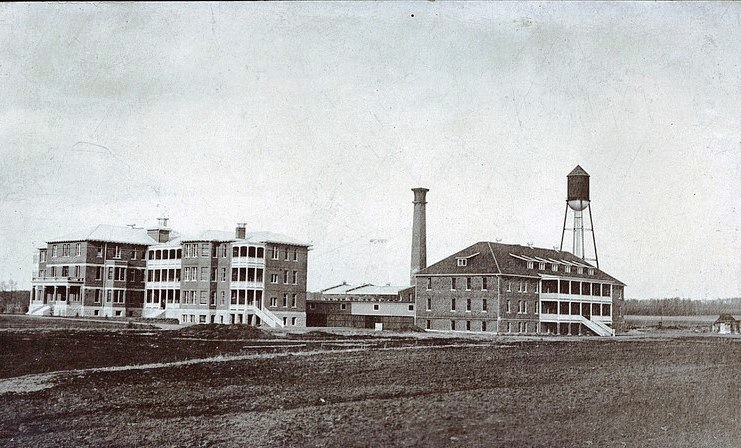Dealing appropriately with mental illness and brain injuries are ongoing major challenges.
Even with the advances of modern medicine, effective treatment and care can be extremely difficult.
Dealing with mental illness and brain injuries became an especially critical issue in the years following the First World War. Ten of thousands of men came home from the War with incredible wounds to their minds and brains. The health care system was overwhelmed by the numbers.
Special hospitals, known as sanitoriums, were created at Red Deer and Oliver, in addition to the existing institution at Ponoka. Nevertheless, the facilities and resources for the treatment of those with mental illness and brain injuries remained woefully inadequate.
Inevitably, a major tragedy occurred.
Dr. Arthur Hobbs was a long-time veterinarian with the Mounted Police who had been badly injured when a horse kicked him in the head. In addition to his brain injuries, he became deeply depressed.
In May 1927, he was admitted as a patient at the Ponoka Mental Hospital.
Dr. Hobbs often had delusions that attempts were being made to poison him. Consequently, he was very reluctant to eat. Various measures were taken to first encourage and then force him to eat and drink.
On Sept. 15th, 1928, a new attendant, Russell Lord, attempted to feed Dr. Hobbs his lunch. When his efforts failed, a more experienced attendant, Walter Scott, came along. When the patient continued to passively resist eating, Scott lost his temper.
Scott began to hit Hobbs severely on the head and chest. Although the patient was put into a straightjacket, and taken to another room, Hobbs’ beatings continued.
By evening, Hobbs was obviously doing poorly.
Lord belatedly went to the acting medical superintendent to say what had happened. An examination revealed that Hobbs had several broken ribs and a punctured lung. Pneumonia set in. Hobbs soon passed away.
An inquest was held in Red Deer. Lord was the main witness. Scott denied any guilt. The coroner’s jury unanimously ruled that Dr. Hobbs had died as a result of the beatings by Scott.
Scott was then charged with manslaughter.
Shortly after the inquest, Lord was mobbed by seven fellow attendants at the Ponoka Hospital. He was covered with a sheet and severely beaten on the head and chest. His head was also pushed into a tub of ice-cold water until he almost drowned.
Lord’s attackers were quickly identified. They were charged with assault and sentenced to two months in prison. In October, 1928, Scott’s trial for manslaughter commenced at the Red Deer Court House.
Despite a vigorous defense by two highly experienced and talented lawyers, as well as Scott’s continued insistence that he was innocent, Justice Frank Ford ruled that the defendant was guilty as charged. Scott was then sentenced to five years imprisonment at the Prince Albert Penitentiary.
The political fallout, however, continued.
People demanded to know how a defenseless man could be so badly beaten just because he passively declined to eat. The Minister of Health, George Hoadley and Premier John Brownlee refused to hold a public inquiry.
Instead, two noted doctors were hired to look into the situation. They found that the mental institutions in Alberta were badly overcrowded and understaffed. They also found that the treatment of patients could be, “More humane and up-to-date.”
The Provincial Government consequently agreed to spend money on an expansion to the Ponoka and Oliver institutions. Although the Red Deer sanitorium had been converted in 1923 into a facility for the care and education of mentally handicapped children, a large addition was constructed there as well.
Nevertheless, deep-rooted problems continued with Alberta’s system for the care of the mentally ill, brain injured and mentally handicapped.
Despite these moves and some other over-due reforms, problems with Alberta’s institutions continued.



